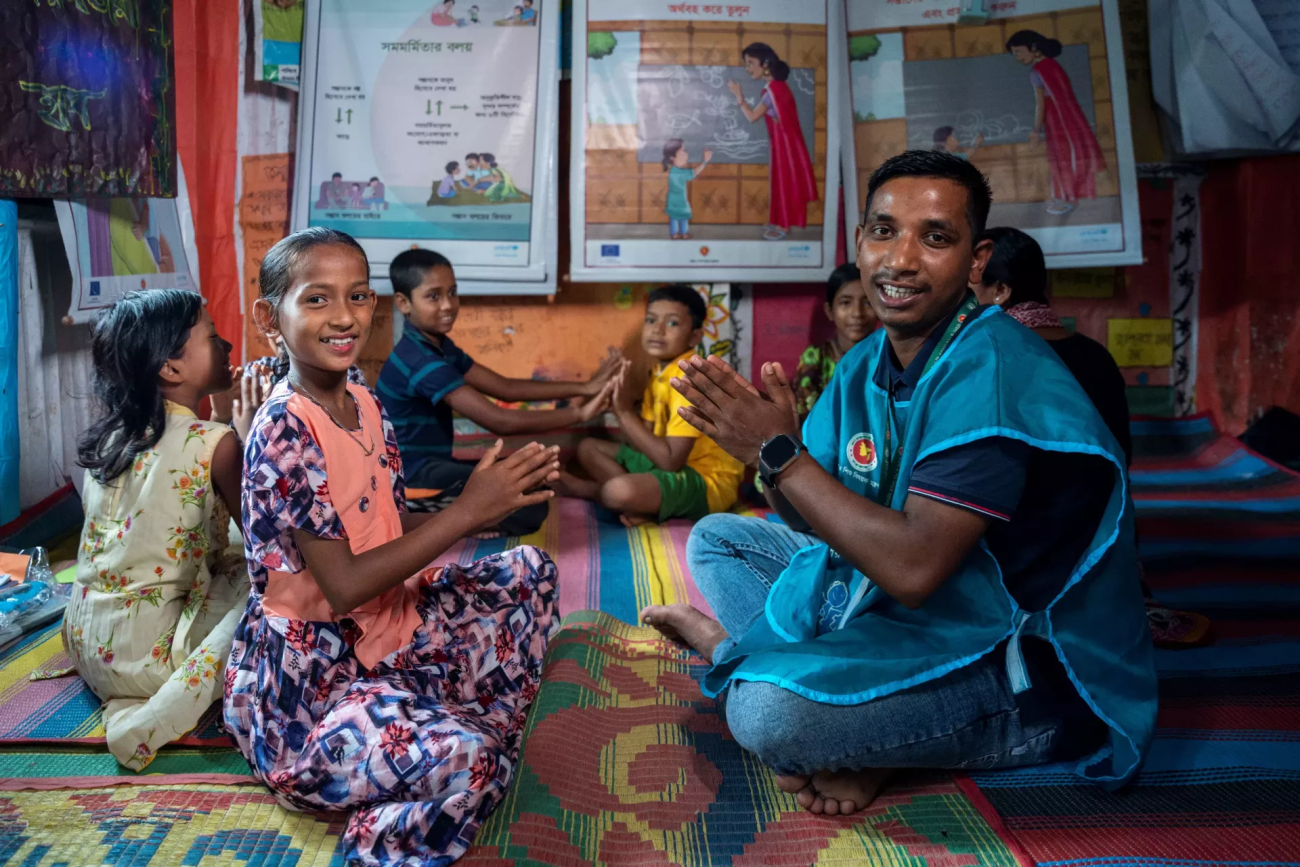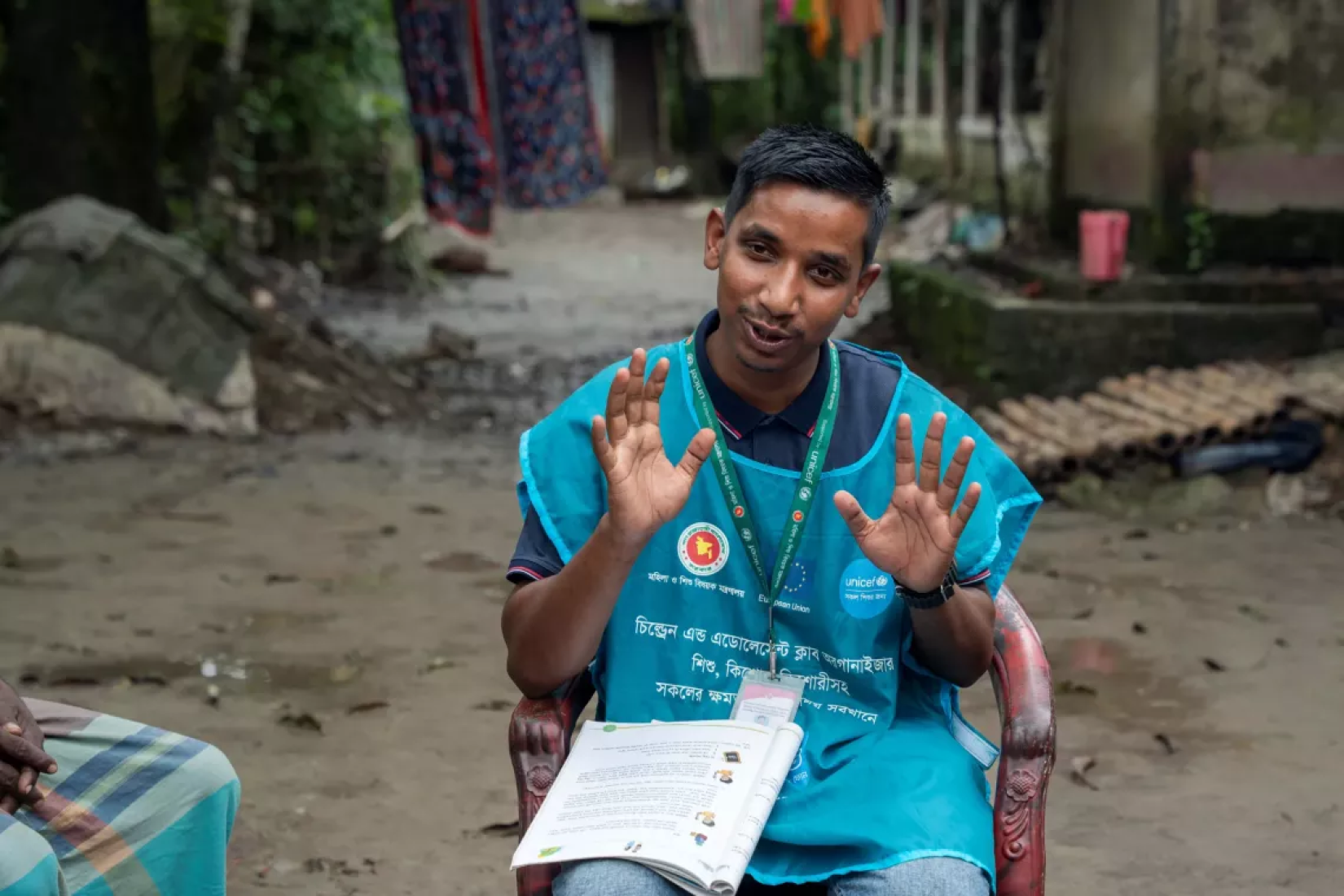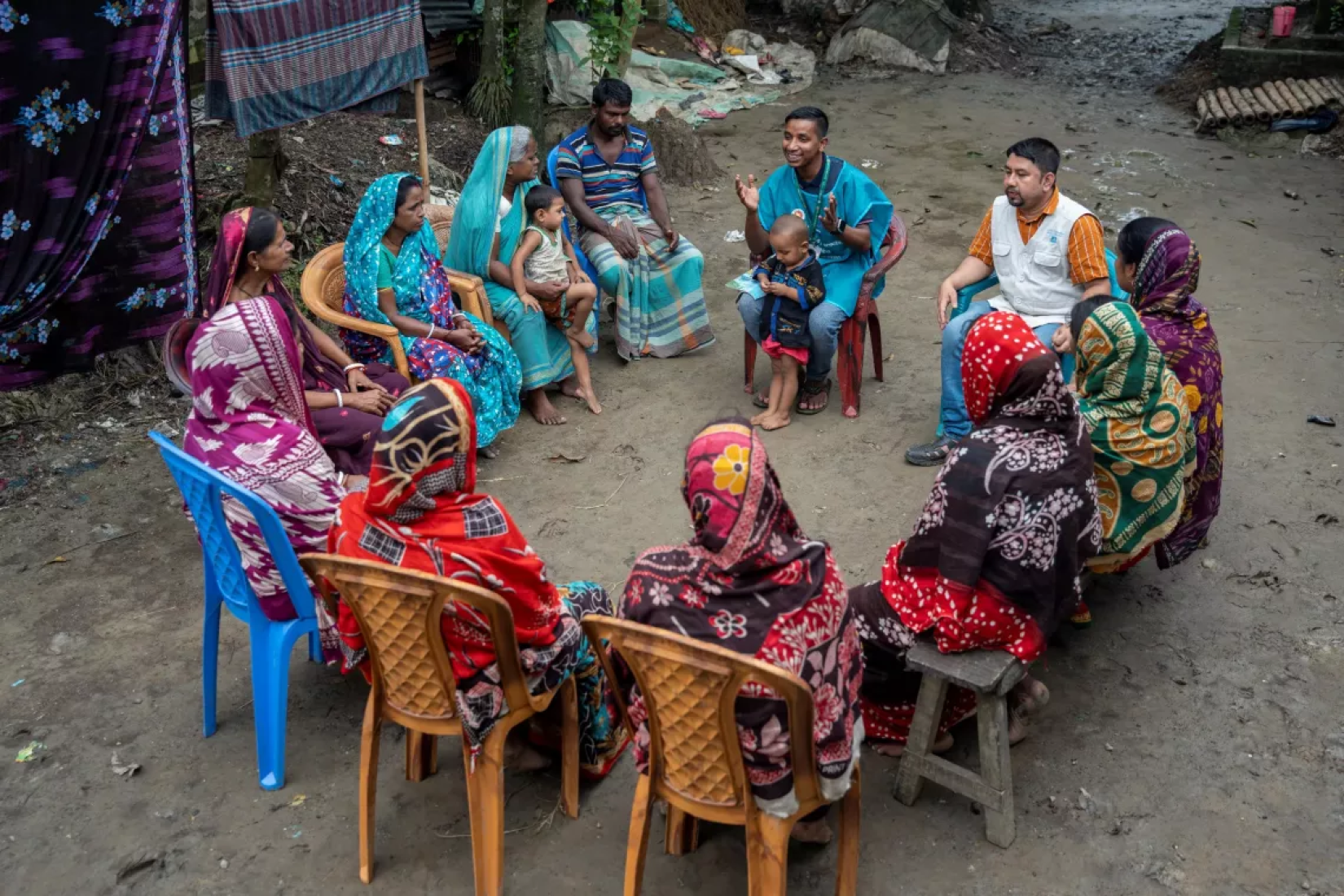Rising waters, rising spirits

With the support of a social worker, a UNICEF-supported child grew up to become the village’s hero.
Sunamganj, BANGLADESH
Everyone in the village knows about Sumon, the 24-year-old Child Protection Community Hub Organizer who braced against floodwater to deliver medicines and water purification tablets.
Sumon has been well-known as a passionate leader of the Child Protection Community Hub led by the Ministry of Women and Children (MoWCA) with UNICEF support, yet some villagers are taken back. No one would imagine that during severe floods, he would choose to go to an area that everyone wanted to run away from.
After all, it was Eid day.
Collaboration between community volunteer and social worker
“The water kept rising. So, I ran from one Child Protection Community Hub to another to see how the situation looked like and tried to save all the hub’s materials,” Sumon says.
Sumon was determined to move all the children’s books, drawings, toys, and handmade crafts to higher grounds. Once a boy looking forward to each day of activities in the hub, he knew for many children, these materials were their world. More than often, the Child Protection Community Hubs offer the only space where children can engage in recreational activities and fully feel seen, safe, and empowered.
Thanks to UNICEF and its partners, MoWCA has established 2,196 Child Protection Community Hubs in the country’s most vulnerable areas, including those emergency-prone. A community-led approach has been adopted, with over 90 percent of the hubs donated by local communities.
Sumon was accompanied by Hillol, the only social worker assigned to a population of more than 200,000 people. The needs had become even more immense when disasters hit. The heavy rain made it difficult to contact the community, and his office is four to five kilometers away.
“There is a need for more social workers. In this upazila, only one social worker is managing a lot of work. One time, I had to register 800 children with disabilities. They are not in one place, so I had to visit many families and areas,” shares Hillol. “In between, I had to complete other assignments and requests. So, I could not fully focus on child protection work.”
The water keeps rising
Knees deep in cold floods, which keep coming back and increasing every year, Hillol and Sumon trudged through water and thick mud to visit more than 20 child protection hubs and different communities. Without available boats, they sometimes swam.
“I work very closely with Sumon. I remember during the floods in 2022, he also referred families and children in need to me,” shares Hillol. “Because he is familiar and popular with the community, he runs the activities smoothly. This time, through Sumon, I have registered 170 children with disabilities for cash support.”
Under the Department of Social Services, Hillol is working with CPCH organizers and volunteers on the frontline like Sumon to provide disaster-affected children and families with food, cash, dignity kits1, and psychological first aid, while registering vulnerable children for further social service support. They are also ready to tackle any signs of harmful practices potentially exacerbated by the situation.
“Natural disasters often lead to child marriage and child labor,” observes Hillol.
According to an evidence brief by UNFPA, climate change and related environmental crises cause economic shocks and worsen drivers of child marriage, particularly for those dependent on the environment for their livelihoods2.
This reality is evident in Sumon’s community: when families have little to eat, marrying off their daughters early or taking children out of school for work at least offers hope of a better future for all.
Once a boy in the hub
More than ten years have spanned since Sumon joined the UNICEF-supported hub as an adolescent boy. It was where he first met Hillol, who at the time worked for another UNICEF-supported NGO. For Sumon, Hillol is not only an ally who help him in his current work, but also a mentor sowing the seeds of his passion for community organizing and child protection.
“Hillol and other social workers used to go to our village to facilitate trainings and activities. I saw them as role models,” recounts Sumon. “When they didn’t come, I would call them and ask, why are you not coming?”
Like Sumon, Hillol could still recall those days. The active adolescent would always invite community members, parents, and caregivers to any recreational activities and awareness sessions on harmful practices like child marriage and child labor. At the time, several villagers viewed the hub negatively for facilitating activities joined by both girls and boys.
“They complained to Sumon’s parents that he was taking girls out of the house. He was really stressed. But he kept convincing them that the hub was not only about having fun,” comments Hillol.

Change starts from the community
Sumon didn’t give up. Forming adolescent groups, going door to door, convincing villagers against child abuse and exploitation, engaging in difficult conversations, he deeply believes that the solutions lie within the community. Once mindsets and behaviors shift, changes will take place. With time, the community starts to trust the club3 because they trust Sumon. He was even voted to become a peer leader of the club in 2015.
“If Sumon says he will come at 9am to talk to the community about something, he will show up at 9 am. He is never late. He says what he does and keeps his words,” shares Raj, a community member. “He has our trust.”
The happiest person in the world
Despite the challenging nature of their work, Hillol and Sumon press on. Together, they have stopped many child marriages and showed up whenever the community needs them.
For Hillol, his reward is seeing Sumon grow up to become the man he is today. And for Sumon, a proud smile spreads across his face whenever he talks about work. He showed his Facebook post, which mobilized blood donations for a pregnant mother in critical condition during the floods.
“I have made a difference in the society,” shares Sumon. “This gives me a lot of happiness and joy. I feel like the happiest person in this world.”

[1] Dignity kits contain women's personal hygiene products.
[2]Child Marriage and Environmental Crises: An Evidence Brief,PA, 2021
[3] The Child Protection Community Hub (CPCH) was previously known as the Children and Adolescents Club.











